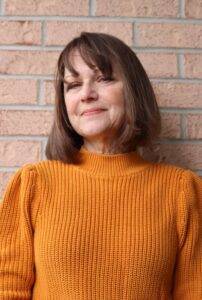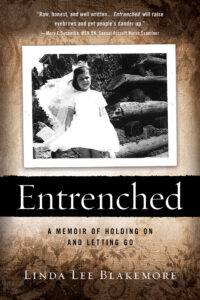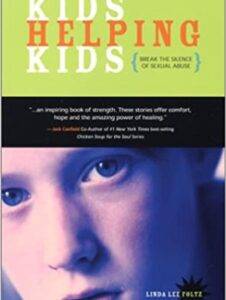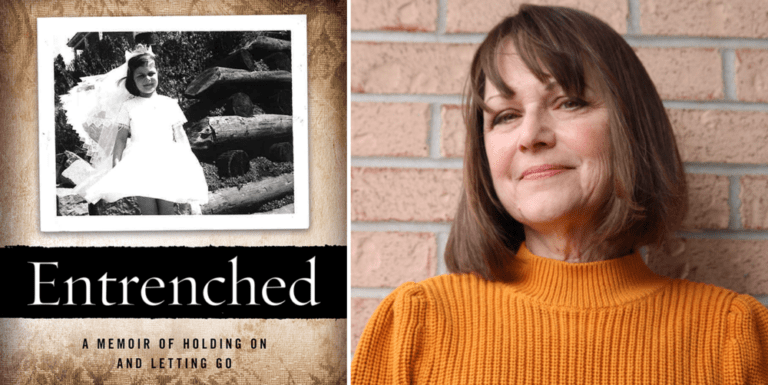From the Publisher: “When a destructive affair with an older, married boss ended in sexual assault, Linda was grateful her husband took her back. The reconciliation was short-lived. Linda quickly found herself drawn to another older, married man. Even though he was selfish and controlling, she needed to be the one he chose. She got her wish. Shortly after he proposed, the return of her repressed memories of childhood sexual abuse almost destroyed Linda and her new relationship. She persevered and they married. But just as he had done to his first wife, every two years her second husband left her. Linda always took him back- even after he moved in with his friend, a man charged with possession of child porn. Why did Linda cling to this unhealthy relationship? Would she ever find the strength to let go?
On average a woman will leave an unhealthy relationship seven times before leaving for good. And why do we choose the wrong partner in the first place? The answer can most often be found by exploring past trauma. Our past formulates self-worth, how we attach to others, and how we believe we deserve to be treated. Given the important and timely focus on workplace sex assault/harassment, intimate partner sex assault, child sex abuse and trafficking, Entrenched: A Memoir of Holding On and Letting Go will resonate with anyone who has been or knows a victim—and the numbers are staggering.
One in four girls is a victim of child sexual abuse and a child victim is six times more likely to be sexually assaulted again as a teen or an adult. Each year in the U.S. there are 463,634 victims (12 or older) of rape and sexual assault—that’s one in five women. Almost half of those assaults are perpetrated by an acquaintance. One in three women experience physical violence by a current or former partner. More than three women are murdered by her partner or former partner in this country every day, that’s over 4,000 women each year.
Blakemore writes for each of these women. She is one of them. Her poignant true story sheds light on the aftermath of child sexual assault and highlights the pain and self-blame a victim often feels following intimate sexual assault. As the author confronts her past and heals, her journey creates a powerful resource for any woman who has experienced intimate sexual assault, workplace sexual assault, childhood sexual abuse, or abandonment.”
More info About the Author: Linda Lee (Foltz) Blakemore is a passionate speaker and award-winning (Pittsburgh) author. In addition to her top selling non-fiction book, Kids Helping Kids Break the Silence of Sexual Abuse (Linda Lee Foltz), Linda’s most recent release, Entrenched: A Memoir of Holding On and Letting Go, received 1st place in the 8th Annual TAZ Awards (December 2022). Entrenched is a recommended resource at DomesticShelters.org and being used as an educational and intervention tool at Rape Crisis, Domestic Violence, Women’s Centers and Shelters, therapists. and advocates across the country.
Blakemore is a Survivor-Speaker for the National Coalition Against Domestic Violence. She works with Dress for Success and domestic violence, rape crisis, and women’s shelters to educate and help women “conquer their past and embrace their best future.” She conducts free “survivor-to-author” workshops for anyone looking to heal or help others.
Linda’s books have been endorsed by hundreds of professionals around the world including Jack Canfield, (co-author of Chicken Soup for the Soul), Dr. Robert Brooks, (Harvard Medical School co- author of Raising Resilient Children), Sue Williams Silverman, (Because I Remember Terror, Father I Remember You), Lori Jakiela, (Belief Is Its Own Kind of Truth), and Pittsburgh Action Against Rape, Center for Victims of Violent Crime, Child Welfare Journal. Articles written by Linda and about her books have appeared in national magazines including America’s Family Resource, Seventeen, and Teen Voices. Linda has spoken at national conferences and women’s groups, and has appeared in videos and podcasts, and on radio and television including The Montel Williams Show.
Through her charitable trust, all proceeds from Linda’s books are donated to the agencies who work to educate, advocate, and protect women and children. She and her husband currently live in Cranberry Township.
Author Website “Entrenched is a powerful and heart-wrenching account of a woman coming to terms with workplace sexual assault, partner sexual assault, and child abuse. Linda Lee Blakemore wears her heart on her sleeve in this vulnerable but empowering story…Blakemore writes for all the victims of abuse and proves that you can get past the pain with some courage.” —San Francisco Book Review
“[C]ourageous and inspirational… a well-written… account of a survivor’s odyssey. Blakemore’s approach to writing is fluidly conversational yet searingly frank… The author doesn’t ask readers to condone her choices but rather to accompany her on her journey of self-understanding… The memoir powerfully delineates how repressed memories of abuse can shape unhealthy relationships in adulthood….” —Kirkus Reviews
“Brave and insightful. Entrenched is an important addition to the literature of abuse and recovery. Blakemore documents the hard emotional journey survivors face as they confront – and overcome – obstacles to their healing. Among the many resources abuse victims can turn to, one of the most helpful is the personal narrative of someone who found the courage to face their demons – both external and internal – and the strength to change. Blakemore is that kind of writer: clear-eyed, perceptive, and willing to tell her truth no matter what.” —Sue William Silverman, author, Because I Remember Terror, Father, I Remember You
“Emotionally evocative, courageous and spot on!” —Paradise Kafri, Sexual Assault Advocate
“Riveting, brave, and transparent…The effects of trauma rule our lives until we take a chance, take charge and work through it. Entrenched will give you the courage to do just that.” —Marnie Grundman (TedX Talk)
Q & A with Linda Lee Blakemore
 Tell us a little about yourself and how long have you been writing?
Tell us a little about yourself and how long have you been writing?
Born and raised in Pittsburgh, I am grateful to all the amazing teachers who encouraged me to write. I am also grateful to that college professor who told me to, “give up the dream.”
Be it defiance or determination, quitting was never an option for me. Writing had always been a part of who I was. Even as a child I could be found holed-up in my room with a tablet and a pen. As an adult— a mother of four children in five years—busy life took me away from the craft. But with the return of my repressed memories of child sexual abuse, the therapist at Pittsburgh Action Against Rape recommended the book, The Courage to Heal, by Ellen Bass and Laura Davis. Each chapter ended with a writing exercise that brought me back to the writing I loved, and the writing I needed to heal.
How did you come to write your first book?
It had taken so many to help me heal, I wanted to give back. I thought I would do that by writing a novel about a young girl, like me, who had been sexually abused. I even landed a literary agent. The agent did not want me to write a novel. “There’s power in the truth,” she said. I didn’t know much about memoir, but I wasn’t healed or evolved enough to tell my story. Plus, at that time, my mother didn’t even know what had happened to me.
 When telling my story was not an option, the literary agent suggested I find a place to volunteer. I chose Pittsburgh Child Advocacy. One day a child came in for his forensic interview. I never met the little boy, but his story was on the lips of everyone who passed through the halls. Having been sexually abused for years, the ten-year-old lashed out, raping his five-year-old sister. I could not sleep that night and I could not get those children out of my head. Prevention and intervention had to do more. But what?
When telling my story was not an option, the literary agent suggested I find a place to volunteer. I chose Pittsburgh Child Advocacy. One day a child came in for his forensic interview. I never met the little boy, but his story was on the lips of everyone who passed through the halls. Having been sexually abused for years, the ten-year-old lashed out, raping his five-year-old sister. I could not sleep that night and I could not get those children out of my head. Prevention and intervention had to do more. But what?
I knew that my own children were more likely to listen to other children—that’s when the idea came to me. Kids Helping Kids Break the Silence of Sexual Abuse would tell the true stories of child survivors to educate and keep children safe, to intervene if a child is trapped in silence, and to offer hope for healing. In six short months I had all the interviews needed, supporting chapters were complete, publishing contract was signed, and endorsements and speaking engagements were rolling in. I spent the next few years traveling the country, speaking at conferences and roundtables. Articles written by me and about my books were published in national magazines, and, along with one of the children in my book, I appeared on the Montel Williams Show as “the professional.” Although I was still entrenched in an unhealthy second marriage, I considered myself healed.
You weren’t ready to tell your story in your first book. What changed?
 One day, many years after publishing my first book, after my second husband left me for the fourth time—this time to move in with his friend, a man who had been charged with possession of child pornography, I started writing again. This time I started writing to understand the demons that possessed my second husband. What I found were the demons inside me.
One day, many years after publishing my first book, after my second husband left me for the fourth time—this time to move in with his friend, a man who had been charged with possession of child pornography, I started writing again. This time I started writing to understand the demons that possessed my second husband. What I found were the demons inside me.
Over the course of twelve years, slowly, the process shifted from writing about my husband, to writing about myself. I did not use an outline. I wrote as the scenes revealed themselves to me. I sat with what I remembered and thoughtfully evaluated what I had written. Through that long and sometimes painful process, I gained clarity and began to understand myself and my past as I had not understood before.
One day I remembered something especially traumatic, and suddenly my life choices made sense. I knew why I left a kind and loving husband for a married boyfriend who, in the end, sexually assaulted me. I knew why I had been drawn to my unhealthy second husband and why I always took him back. I also knew there was an important lesson for other women in my story, but I was terrified to expose myself, my mistakes, and my bad choices for all the world to see.
What made you decide to publish this very personal story?
One day I was asked to have lunch with a young woman who had been making a lot of bad choices in her relationships and in her life. I could give her sage, motherly advice and tell her what to do and what not to do. But I knew she would be more likely to listen to and learn from my journey.
After I told her my story, she got up, came around the table and hugged me. Telling her my story had helped her understand what she hadn’t been able to make sense of before. That’s when I knew that my long-time writing friends were correct—my story could make a difference for other women. No matter how scary it might have felt, I had to put myself out there.
What are your goals or intentions with this book?
- To Help Other Women through my story:
After reading my story, some might not understand my choices, others might judge me. That’s a risk I am willing to take. If my story spares just one woman some of the pain and heartache I endured, publishing this book will have been well worth it.
Marnie Grundman said, “The effects of trauma rule our lives until we take charge, take a chance, and work through it. Entrenched: A Memoir of Holding On and Letting Go will give women the courage to do just that.” I hope Marnie Grundman is right.
- To Help Other Women use writing to understand and heal:
I offer a free, 3-part, online writing workshop: Survivor to Author, for those who would like to explore the art of writing to further their healing or help others.
- To Help financially:
It’s no secret that social services agencies are under-funded. Through my Charitable Trust, maintained by the Pittsburgh Foundation, the proceeds from the sale of my books have been and will continue to be donated to the agencies who work to educate and protect women and children.
Does writing about heavy topics energize or exhaust you?
While it may seem counter-intuitive to think that writing about a negative experience can have a positive effect, when you translate emotional experiences into words, it can help you change the way those events are organized in your brain.
Putting trauma on the page separates that trauma from you. You can pick it up anytime you want, but you are in charge. It is no longer inside your head or your heart, keeping you fixated and anxious. Guided, detailed writing not only helps you process what you’ve been through, it can help you envision a healthy, happy pathway forward.
What do people need to know about abuse and surviving an unhealthy relationship?
The statistics are staggering:
- One in four girls (and one in six boys) is a victim of child sexual abuse
- A child victim is six times more likely to be sexually assaulted again as a teen or an adult (source)
- Each year in the United States alone there are 463,634 female victims (12 or older) of rape and sexual assault—that’s one in five women (source)
- Almost half of those assaults are perpetrated by an acquaintance and one third are never reported
- One in three women experience physical violence by a current or former partner (source)
- More than three women are murdered by their husbands or partners in this country every day—that’s 4,000 women each year
- A woman is more likely to be killed by a male partner (or former partner) than any other person
- Of the total domestic violence homicides, about 75% of the victims were killed when they attempted to leave the relationship or shortly after the relationship had ended (source)
We choose our partners based on our unresolved childhood issues. I heard those words from every therapist I saw. Most of them said it multiple times. But I was so entrenched in my emotional turmoil, I was not able to see how any of it applied. After twenty years, twelve therapists, countless personal and academic deep dives, and two books, I can finally say, “I get it.”
We all have a past. Our past formulates our self-worth, how we attach to others, and how we believe we deserve to be treated. When our past is cloaked in unresolved trauma, that trauma can, and often does, lure us toward unhealthy partners in an attempt to remember, work through psychological issues, or fulfill what we did not get or could not control as a child.
It’s normal, even protective, to push harrowing events so far into our subconscious that we only recall snippets or don’t remember any of it. In fact, a painful experience may be so buried, it could take a “triggering” event to unearth it. (My therapist called my triggering event ‘my emergency’.) Even when the experience is only available to our subconscious, it is still very much a part of who we are, affecting the partners we choose and the life decisions we make. So, as the daughter of an alcoholic might be drawn to a drinker, an adult survivor of child sexual abuse might be drawn to a narcissist.
If a woman finds herself gravitating toward unhealthy intimate partners, or if she continues to return to an unhealthy relationship, like I did, there is a good chance something deeper is at work inside of her, too. I urge every woman, “Please do not put yourself in physical or emotional danger. Get into therapy and stay in therapy until you figure out what’s going on. Overcoming trauma is not easy or quick, but your happiness and your safety depend on it.
What perspectives or beliefs regarding surviving abuse and healing have you challenged with this work?
None of us is bigger than our trauma. No matter how strong, smart, educated, or resourceful we may be, we cannot “will” ourselves through or beyond trauma. We cannot ignore or stuff it. We must confront it.
Healing is a life-long journey. It comes in baby steps and awkward, unsuspecting tugs and jerks. For many, like me, a traumatic event can trigger multiple psychological wounds–a myriad of issues that may not present at the time same time or in the same way. But each of these reactions to trauma must be addressed, each in its own time, each in its own order, if we are to fully heal.
What resources do you recommend?
Domestic Violence Hotline at 800-799-SAFE (7233),
Pittsburgh Action Against Rape at 412-431-5665,
National Sexual Assault Telephone Hotline at 800-656-HOPE (4673) and
Center for Victims of Violent Crime at 412-482-3240.
More can be found in my books, and in my website: https://lindaleeblakemore.com/resources
What are your plans for future projects?
In conjunction with my free, online Survivor to Author 3-part writing workshop, I am working on my next book, a practical workbook to assist those who want to use the art of writing and storytelling to promote their healing or help others.
Entrenched: A Memoir of Holding On and Letting Go
CHAPTER 1
I C A N ’T H E L P Y O U
I HADN’T CRIED one drop. I had been too angry to feel sad. I don’t know if I couldn’t hold back any longer or if I just felt safe enough with Meredith, but the minute she motioned me into her office, tears streamed.
I sat in the armchair next to the empty loveseat. Meredith, in a crisp navy dress and perfectly sculpted bob, sat erect on her platform rocker. She opened a manila folder, flipped her tablet to a clean page, and clicked her pen.
“What’s going on?” she asked.
“He’s at it again.” I pulled a tissue from the box on the side table next to me and dabbed at my eyes.
“How many times has he done this?”
“Five.”
“Why is his behavior acceptable to you?”
I bowed my head. “It’s not.”
“What do you want?” she asked.
“I don’t know, a miracle?” I forced a smile as my eyes rose to meet hers.
Meredith did not smile back. She stood, pulled her arms across her chest, and clutched my file. “I’m sorry, but I can’t help you if you want him back.”
Did my therapist just fire me? “What?”
“I cannot help you if you want him back.”
Stunned, I rose and made my way out the door.
This excerpt from Entrenched is published here courtesy of the author and publisher and should not be reprinted without permission.

























